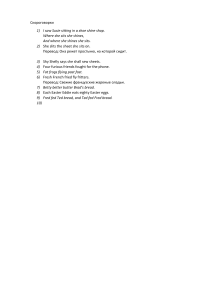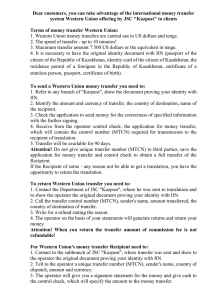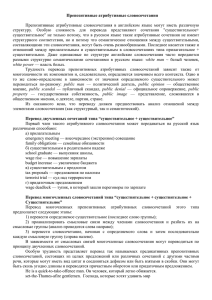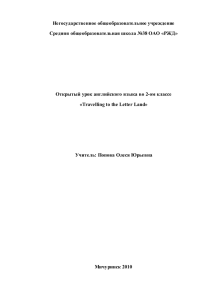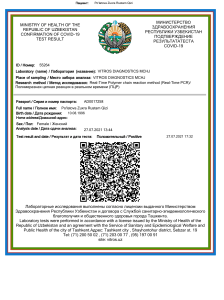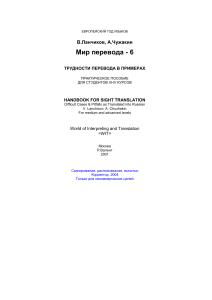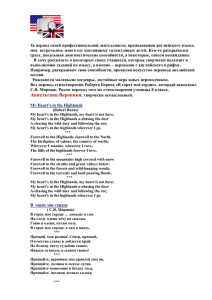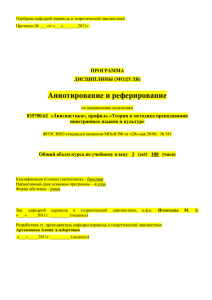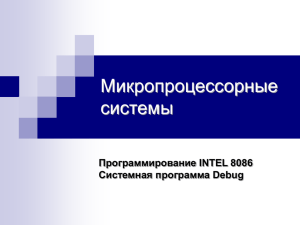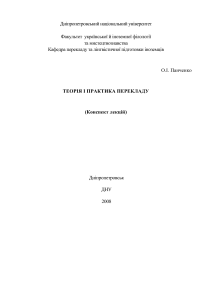News Brief: Stress may break diet willpower
реклама
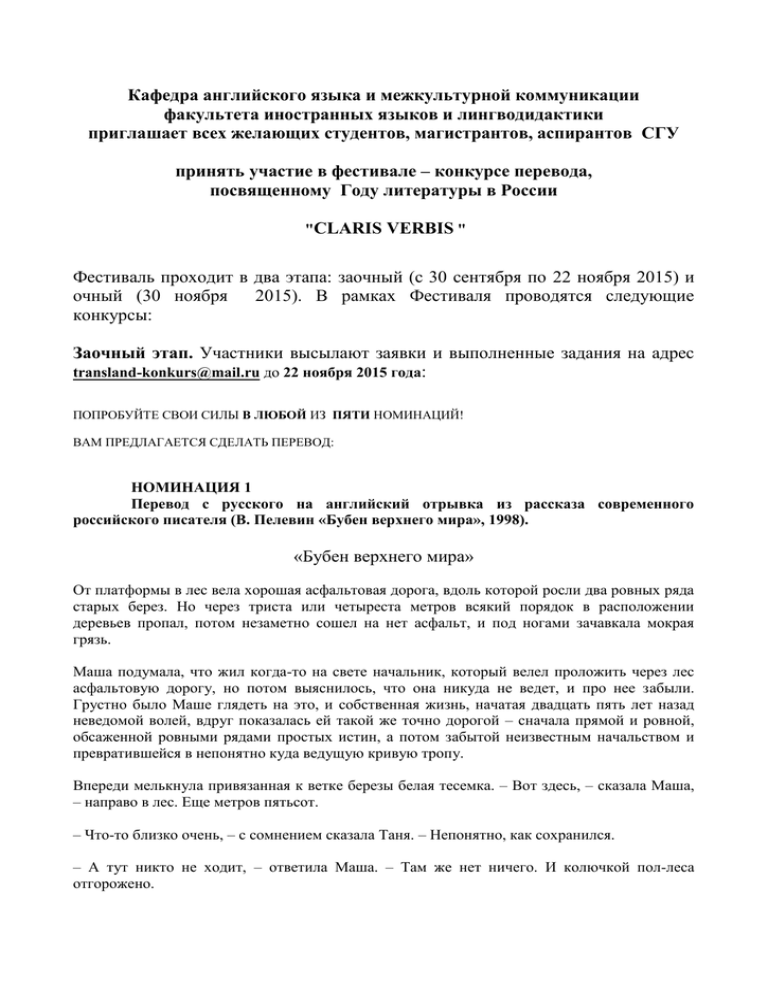
Кафедра английского языка и межкультурной коммуникации факультета иностранных языков и лингводидактики приглашает всех желающих студентов, магистрантов, аспирантов СГУ принять участие в фестивале – конкурсе перевода, посвященному Году литературы в России "CLARIS VERBIS " Фестиваль проходит в два этапа: заочный (с 30 сентября по 22 ноября 2015) и очный (30 ноября 2015). В рамках Фестиваля проводятся следующие конкурсы: Заочный этап. Участники высылают заявки и выполненные задания на адрес transland-konkurs@mail.ru до 22 ноября 2015 года: ПОПРОБУЙТЕ СВОИ СИЛЫ В ЛЮБОЙ ИЗ ПЯТИ НОМИНАЦИЙ! ВАМ ПРЕДЛАГАЕТСЯ СДЕЛАТЬ ПЕРЕВОД: НОМИНАЦИЯ 1 Перевод с русского на английский отрывка из рассказа современного российского писателя (В. Пелевин «Бубен верхнего мира», 1998). «Бубен верхнего мира» От платформы в лес вела хорошая асфальтовая дорога, вдоль которой росли два ровных ряда старых берез. Но через триста или четыреста метров всякий порядок в расположении деревьев пропал, потом незаметно сошел на нет асфальт, и под ногами зачавкала мокрая грязь. Маша подумала, что жил когда-то на свете начальник, который велел проложить через лес асфальтовую дорогу, но потом выяснилось, что она никуда не ведет, и про нее забыли. Грустно было Маше глядеть на это, и собственная жизнь, начатая двадцать пять лет назад неведомой волей, вдруг показалась ей такой же точно дорогой – сначала прямой и ровной, обсаженной ровными рядами простых истин, а потом забытой неизвестным начальством и превратившейся в непонятно куда ведущую кривую тропу. Впереди мелькнула привязанная к ветке березы белая тесемка. – Вот здесь, – сказала Маша, – направо в лес. Еще метров пятьсот. – Что-то близко очень, – с сомнением сказала Таня. – Непонятно, как сохранился. – А тут никто не ходит, – ответила Маша. – Там же нет ничего. И колючкой пол-леса отгорожено. Действительно, скоро впереди появился невысокий бетонный столб, в обе стороны от которого уходила провисшая колючая проволока. Потом стали видны еще несколько столбов – они были старые и со всех сторон густо обросли кустами, так что заметить проволоку можно было только подойдя к ней вплотную. Девушки молча пошли вдоль проволочной ограды, пока Маша не остановилась возле очередной белой тесемки, свисающей с куста. – Здесь, – сказала она. Несколько рядов проволоки были задраны и перекручены между собой. Маша и Таня поднырнули под нее без труда, а Тыймы полезла почему-то задом, зацепилась рубашкой и долго звенела своими колокольчиками, ворочаясь в узком просвете. НОМИНАЦИЯ 2 Перевод стихотворения. Schroedinger's Cat I have been reading of Schroedinger's cat But none of my cats are at all like that. This unusual animal (so it is said) Is simultaneously live and dead! What I don't understand is just why he Can't be one or other, unquestionably. My future now hangs in between eigenstates. In one I'm enlightened, the other I ain't. If you understand, then show me the way And rescue my psyche from quantum decay. But if this queer thing has perplexed even you, Then I will and won't see you in Schroedinger's zoo. НОМИНАЦИЯ 3 Перевод с английского на русский специального текста. Now that the use of on-line publication databases is prevalent, writing a really good abstract has become even more important than it was a decade ago. Abstracts have always served the function of "selling" your work. But now, instead of merely convincing the reader to keep reading the rest of the attached paper, an abstract must convince the reader to leave the comfort of an office and go hunt down a copy of the article from a library (or worse, obtain one after a long wait through inter-library loan). In a business context, an "executive summary" is often the only piece of a report read by the people who matter; and it should be similar in content if not tone to a journal paper abstract. Checklist: Parts of an Abstract Despite the fact that an abstract is quite brief, it must do almost as much work as the multipage paper that follows it. In a computer architecture paper, this means that it should in most cases include the following sections. Each section is typically a single sentence, although there is room for creativity. In particular, the parts may be merged or spread among a set of sentences. Use the following as a checklist for your next abstract: Motivation: Why do we care about the problem and the results? If the problem isn't obviously "interesting" it might be better to put motivation first; but if your work is incremental progress on a problem that is widely recognized as important, then it is probably better to put the problem statement first to indicate which piece of the larger problem you are breaking off to work on. This section should include the importance of your work, the difficulty of the area, and the impact it might have if successful. Problem statement: What problem are you trying to solve? What is the scope of your work (a generalized approach, or for a specific situation)? Be careful not to use too much jargon. In some cases it is appropriate to put the problem statement before the motivation, but usually this only works if most readers already understand why the problem is important. Approach: How did you go about solving or making progress on the problem? Did you use simulation, analytic models, prototype construction, or analysis of field data for an actual product? What was the extent of your work (did you look at one application program or a hundred programs in twenty different programming languages?) What important variables did you control, ignore, or measure? Results: What's the answer? Specifically, most good computer architecture papers conclude that something is so many percent faster, cheaper, smaller, or otherwise better than something else. Put the result there, in numbers. Avoid vague, hand-waving results such as "very", "small", or "significant." If you must be vague, you are only given license to do so when you can talk about orders-of-magnitude improvement. There is a tension here in that you should not provide numbers that can be easily misinterpreted, but on the other hand you don't have room for all the caveats. Conclusions: What are the implications of your answer? Is it going to change the world (unlikely), be a significant "win", be a nice hack, or simply serve as a road sign indicating that this path is a waste of time (all of the previous results are useful). Are your results general, potentially generalizable, or specific to a particular case? Writing an efficient abstract is hard work, but will repay you with increased impact on the world by enticing people to read your publications. Make sure that all the components of a good abstract are included in the next one you write. https://spie.org/Documents/Publications/How%20to%20Write%20an%20Abstract.pdf НОМИНАЦИЯ 4 Перевод с английского на русский публицистического текста. News Brief: Stress may break diet willpower By Laura Sanders You’re cramming for a test, worried about a band tryout or at risk of not finishing up some big class project on time. This is stress. And you realize it is hard to hold off eating a doughnut or dish of ice cream. That junk food looks oh so good. It can be hard to help reaching for it. And a new Swiss study now suggests why. Indeed, the study finds, your brain may be conspiring against you. In some people, it may crumple the willpower to eat right. Silvia Maier works at the University of Zurich, Switzerland. She and her colleagues invited 41 young men into the lab for 3 hours of tests. They started by showing each man 180 food items on a computer screen. Each time, they asked the men to judge how healthy, tasty and appealing the food was. Then the researchers stressed out 29 of the guys. They did this by asking each to stick one hand in ice water for three minutes. If the water was too unpleasant, the volunteers could remove their hands, but must continue looking into a video camera. The men were also encouraged to put their hands back into the cold water. All the while, a researcher watched — and videotaped the ordeals. Another 22 men held one hand in warm water. They were not videotaped. Afterward, the researchers showed each man a series of two food items. They did this 210 times. And before they started making their picks, the men were told “to choose the healthier of the two items whenever possible.” When the testing was over, the scientists gave the volunteers a snack. Each man got one of the items he had said that he preferred. Despite being coached to choose healthy foods, the stressed men proved more likely to pick the less healthy option. The researchers also performed brain scans of the volunteers. It showed what part of the brain was active as they made their choices. “Our findings indicate that stress biases the decision process,” Maier’s team concluded. And it does this, they explain, by altering two brain pathways. One of the affected sets of circuits relays sensory information, such as taste. The other affects a person’s ability to set goals and make decisions to follow through on those goals — such as eating what is good for us. The findings appear in the August 5 issue of Neuron. More studies will be needed to confirm the new findings. But the early signs suggest that stress not only makes junk food more appealing, but also saps the brain’s ability to resist eating it. https://student.societyforscience.org/article/news-brief-stress-may-break-diet-willpower НОМИНАЦИЯ 5 Написание очерка на английском языке по теме на выбор (200-250 слов): “Modern Russian Literature - Innovation and Continuity” “Modern English Literature - Innovation and Continuity” Очный этап (ориентировочно 30 ноября). Участники высылают заявки на адрес transland-konkurs@mail.ru до 25 ноября 2015 года ПОПРОБУЙТЕ СВОИ СИЛЫ В ЛЮБОЙ ИЗ ДВУХ НОМИНАЦИЙ! НОМИНАЦИЯ 6 Конкурс перевода в номинации «Перевод с английского на русский язык афоризмов/кратких изречений». Участникам конкурса дается 60 минут на выполнение задания. Во время выполнения задания разрешается пользоваться словарями и Интернетресурсами. НОМИНАЦИЯ 7 Конкурс чтецов – выразительное чтение литературного произведения на английском языке. Отрывок высылается на электронный адрес участника после регистрации. Участник готовится дома и выступает в назначенный день конкурса. Участники из других городов и стран записывают видео ролик, размещают его на Интернет-ресурсе (http://www.youtube.com/) до 15 ноябряя 2015 в закрытом доступе и отправляют ссылку жюри конкурса по адресу transland-konkurs@mail.ru. ПОБЕДИТЕЛИ БУДУТ НАГРАЖДЕНЫ ПОДАРКАМИ И ПОЛУЧАТ СЕРТИФИКАТЫ! Те участники, которые предложат интересные и остроумные переводы, также получат поощрительные призы! Дерзайте! Пробуйте! Творите! Обратите внимание на следующие правила: 1. Вы можете участвовать в любом количестве номинаций. Для участия в конкурсе по каждой из номинаций подается отдельная заявка. 2. Переводы в разных номинациях присылайте отдельными файлами, указав в названии файла свою фамилию (латинскими буквами) и номер номинации, например Ivanov_1, Ivanov_3. 3. Не разрешается присылать несколько вариантов перевода одной и той же номинации. 4. В файлах должен быть только Ваш перевод, не оставляйте никаких параллельных вставок из текста оригинала. 5. Недобросовестные участники будут дисквалифицированы. Требования к оформлению заявки: ФИО (полностью) Год рождения Пол Адрес электронной почты ВУЗ, факультет, курс, группа Форма обучения (дневная, заочная) Студент/аспирант/магистрант Получаете ли (получили) дополнительное образование «Переводчик в сфере профессиональной коммуникации» (Да/Нет) Номинация (НОМЕР) 2. Требования к оформлению текста перевода: 1. 2. 3. 4. Текст перевода должен быть напечатан через один интервал на бумаге формата А4. Редактор – Microsoft Word. Размер шрифта – 14. Шрифт – Times New Roman. Все поля по 2 см. Абзац - 1,25. 5. Выравнивание по ширине. Выполненные задания нужно высылать на электронный адрес: transland-konkurs@mail.ru до 22 ноября 2015 года. Заявки для участия в очном этапе конкурса нужно высылать на электронный адрес: transland-konkurs@mail.ru до 25 ноября 2015 года. Результаты конкурса и имена победителей будут вывешены на сайте СГУ. Контакты: кафедра английского языка и межкультурной коммуникации, тел. 224-284 Адрес: XII корпус СГУ, 126 ауд. Задания на конкурс перевода можно скачать на сайте кафедры английского языка и межкультурной коммуникации.
